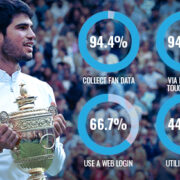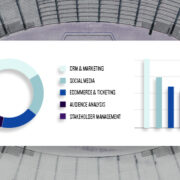European football holds a special place in the sports industry’s modernization; the continent is home to many of the world’s most digitally diverse and data-rich sports clubs, national bodies, and competition organizers, according to N3XT Sports’ proprietary research, many of which sit within the football sphere.
This summer’s UEFA Euro 2024 men’s finals are expected to draw a live audience of more than 5 billion, according to industry projections. Speaking on its significance, UEFA president Aleksander Čeferin said that the event will be cause for celebration considering the challenges faced during the Covid-impacted Euro 2020 edition, describing this year’s European Championships in Germany (June 14 – July 14) as “a true football festival that fans and players rightly deserve”.
Amid the tournament’s global appeal, the event organizer UEFA sits at the cutting edge of fan innovation, while its direct-to-consumer (D2C) portfolio presents audiences with a unified fan experience across web and mobile, which connects fans to its fantasy gaming offering, UEFA.tv over-the-top (OTT) streaming service, and ticketing via a single sign-on (SSO). An industry benchmark, UEFA continues to push boundaries inside football’s modernization and is born from a unique “innovation culture” within the governing body.
And this extends to European football’s national governing bodies, too. Thirteen European nations qualified for the 32-team Qatar 2022 men’s FIFA World Cup, the majority of which boast diverse digital inventories and sophisticated fan-data strategies. As highlighted in our World Cup Data Report 2022, the French Football Federation (FFF) scored highest for its digital transformation efforts, followed closely by the Portuguese Football Federation (FPF) and The Football Association (The FA).
N3XT Sports research is carried out with the sole purpose of highlighting the benchmarks and opportunities for sports properties to digitalize and follows a unique methodology focused on the breadth of each entity’s digital portfolio, their ability to collect first-party fan data, and social media presence. Mobile ownership is a key driver for digital transformation and creating an omnichannel experience across the federations assessed, though not all collect first-party fan data via all owned digital products, whereas some have the capacity to centralize their fan-facing touchpoints via mobile.
As we embark on another summer of sporting excellence, we break down several member associations (MA) represented at UEFA Euro 2024 setting digital and data benchmarks and how they break the mold when it comes to fan engagement, fan-data collection, and integrating data touchpoints into the fan-marketing funnel.
The reigning UEFA Euro 2020 champions Italy is home to one of the tournament’s most digitally mature federations. The Italian Football Federation (FIMG) receives a perfect score for its digital product portfolio, which collects data via an SSO across web, the Casa Azzurri mobile app, online shop, ticketing portal, and livestreaming offering.
By comparison, the FFF represents the best-in-class for both its digital and data maturity, scoring 100 percent for its data-collection capability and digital-product diversity, providing both a universal web login and an SSO across all its digital fan touchpoints. This includes its official website and mobile app, ecommerce and ticketing portals, as well as the FFFtv streaming service and in-app games.
FIGC scores slightly lower (90 percent) since its data-collection capability does not extend to fantasy/gaming. The federation announced the launch of its $ITA fan token in partnership with the fan engagement and rewards app Socios.com, which provides national team fans access to voting rights in polls among other augmented reality-enabled (AR) features, games, and competitions.
This is also the case for the Portuguese Football Federation (FPF), which provides an SSO via all of its data touchpoints, including the Canal 11 streaming platform, operated in partnership with Amazon Web Services (AWS), available via web and mobile. Meanwhile, The FA is one of the most digitally diverse and data-rich competition organizers and governing bodies in the UK, though does not collect first-party fan data via the Fanatics-powered online England Store. Download the Digital Transformation Regional Market Report 2024 | UK to learn more.
“Football’s vast global following places the sport in the unique position for expansion,” explains Mounir Zok, N3XT Sports Chief Executive (CEO). “While already a major influence within popular culture, the game represents more than its feats on the pitch or during the finals of major tournaments. It’s off the field of play where the sport and its federations, leagues, and teams can continue to connect with fans via their digital infrastructure and where potential lies in growing the sport in time for, and beyond, the game’s biggest tournaments.”
WHAT’S N3XT?
European football and its respective national governing bodies showcase a high digital maturity compared to other regions still establishing their digital foundations. MAs such as the Royal Dutch Football Association (KNVB) and the Danish Football Association (DBU) each collect first-party fan data via an SSO, whereas other national bodies such as the Belgian Football Association (RBA) and the German Football Association (DFB) also own sophisticated digital capabilities.
Nevertheless, for every sports property seeking to grow its digital and data capabilities, it is vital that they continue to assess their technical aptitude on an ongoing basis, so as to recognize opportunities to innovate. For example, hosts Germany and the German Football Association (DFB) score lower for their data-collection capabilities, despite owning a diverse digital inventory, due to the fact that fans are required to register more than once across the federation’s digital platforms, including the Official DFB Shop and the mobile-supported DFB Play streaming service.
In order to set a clear roadmap for digital transformation, it’s important for any organization to understand the digital and technological maturity of its current ecosystem. While disparities exist in the footballing ecosystem, including the digital and data capabilities sports organizations and governing bodies display up and down the sporting pyramid, there is a case for broader collaboration between all levels of the sport, to help boost fan engagement and productivity across the spectrum.
Our team at N3XT Sports works tirelessly to develop and implement data and digital transformation strategies across a multitude of sports properties at federation level, competition level, and club level. To find out more about how N3XT Sports can serve your organization, fill out the form below, and we’ll be in touch. Our goal is to drive the digitalization of the sports industry and our clients.



